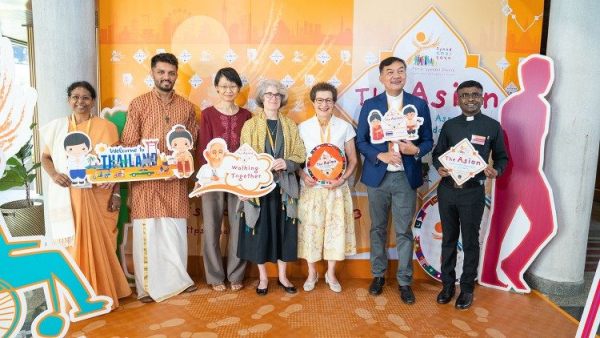Mass of the Holy Spirit opens Asian Continental Assembly on Synodality
 80 delegates from all over Asia entered into communal discernment on Friday, seeking the aid of the Holy Spirit in the opening Mass of the Holy Spirit.
80 delegates from all over Asia entered into communal discernment on Friday, seeking the aid of the Holy Spirit in the opening Mass of the Holy Spirit.
Archbishop Tarcisio Isao Kikuchi, SVD, of Tokyo and Secretary General of the Federation of Asian Bishops’ Conferences (FABC) presided over the Mass that opened the Asian Continental Assembly on Friday. In his homily, he reflected on the synodal journey in Asia as well on his personal experiences as a missionary in Africa.
The synodal journey in Asia has been one of “walking together on the synodal path,” “despite all kinds of difficulties,” Archbishop Kikuchi began. Two of the difficulties he listed are the challenge to “translate official documents into so many different languages of Asia,” and not being “able to gather people together because of the pandemic.” He noted, however, that the synodal journey is not an event that will soon be over, but that the process is part of the “the foundational nature of the Church.” Therefore, “we know this journey will continue after the actual meetings,” he said.
Indifference kills
The Archbishop then recalled two experiences he had in Africa. The first incident he recalled happened in 1995 in Bukavu, then Zaire, where he was working in a refugee camp. People fleeing the genocide in Rwanda had sought refuge in that particular camp. During his three-month stay there, he experienced an armed attack on the camp that lasted two hours. During the attack, he witnessed the killing of thirty refugees. Due to this experience, the Archbishop says he cannot bear to watch a fireworks display anymore.
A bit later, when he visited the camp again, he asked one of the leaders of the refugees what they needed. “I knew there were shortages of everything, not enough food, not enough clothing, not enough medicine and no education for their kids.” But the request that came to him was for none of these things. “Father, when you go back to Japan, tell people we are still here. We are forgotten.” This was the request, which led the Archbishop to conclude that, “indifference could kill people in need of assistance.”
Someone will always care
The second experience the Archbishop related was from his time as a parish priest “in a village in southern Ghana from 1987 to 1994.” Despite the poor economy and a severe drought that left local farmers unable to provide for their families, the Archbishop noticed that the “people seemed happy in their lives, especially when they came to the Church for Sunday Mass.” He especially remembers the singing and dancing and the smiles on the people’s faces. When he asked them “how they could be so happy despite all these difficulties, they told me that they have ‘Ghana Magic.’ ” They explained that this “Magic” was the “conviction that in difficulties no one is forgotten by others. Someone will come to help. Someone will always care about you. That is the Magic.”
These two combined experiences led the Archbishop to conclude, “Indifference could kill people in need of assistance, but solidarity would produce hope to live."
Current crises
Archbishop Kikuchi then recalled two ongoing crises that both began in February. Two years ago, “peace and stability in our neighbour in Asia, Myanmar, was taken away and still needs more prayer to re-establish [a] peaceful country there.” And “exactly a year ago, the crisis in Ukraine started. We should remember [the] people in Ukraine and all the people involved in this war and pray for Peace.”
“We should not forget indifference could produce despair, but solidarity could produce [the] hope to live.”
Centre of producing hope
While both the pandemic and these armed conflicts have forced us to “wander in darkness without any light,” and “we are all uncertain” about what will come next, the Archbishop reiterated, that since “indifference could kill… we need solidarity to produce hope to live.” This is the Church’s mission – “to be at the centre of producing hope,” and never “be the source of despair or sadness. We have to be the source of hope because we have the Gospel of life, [the] Gospel of hope, and we are the ones walking together in solidarity on the path of synodality.”
“We are the ones walking together in solidarity on the path of synodality.”
The Archbishop then concluded his homily inviting those present to “ask [the] merciful Father to send us [the] Holy Spirit so that we would be able to find the way of God to be people of God walking in solidarity on [the] synodal path.”
Accompanied by God’s light
At the end of Mass, Joy Candelario, one of the three moderators for the day, explained that the “symbol of light” would accompany the delegates during the three-day Assembly since the various religions of Asia celebrate “festivals of light.” A representative of each of the twelve small groups was invited forward to bring a candle to their table. “May the light of God,” Ms. Candelario said, “warm our hearts as we also form a small synodal community at the tables, comprised of different representatives from different Asian countries. But more importantly,” Ms. Candelario continued, “may it help us discern the will of God in the different contexts, cultures and challenges of Asia.”
“May the light of God energize us as we discover new synodal pathways during these days.”
Sr Bernadette M. Reis
Source: vaticannews.va
